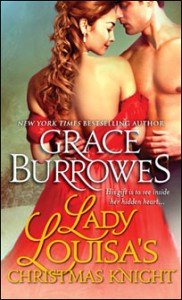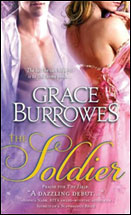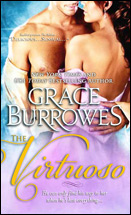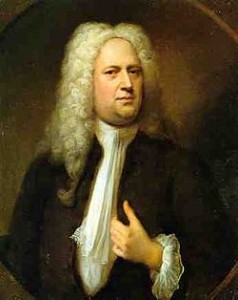This week marks the launch of Lady Louisa’s Christmas Knight, the tale of Louisa Windham and her doting, growling, limping, pig-farming swain, Sir Joseph Carrington. Louisa doesn’t see those qualities in Joseph, though. She sees that he listens to her, he asks her to dance when nobody else has the courage, he recites poetry to her, and he risks his life to save her reputation. Guess what Louisa gets for Christmas?
 And Joseph? He doesn’t see that Louisa is too smart for her own good, nor that she lacks the preferred pale English beauty, nor that she suffers a lack of small talk and flirtation. He sees that she’s brilliant, lonely, brave, loyal, and completely going to waste in the ballrooms and conservatories of Mayfair. How anybody could overlook such a treasure baffles him utterly.
And Joseph? He doesn’t see that Louisa is too smart for her own good, nor that she lacks the preferred pale English beauty, nor that she suffers a lack of small talk and flirtation. He sees that she’s brilliant, lonely, brave, loyal, and completely going to waste in the ballrooms and conservatories of Mayfair. How anybody could overlook such a treasure baffles him utterly.
Michael Hague, a noted teacher in the field of screen writing and story architecture, has a pet peeve with many romances: On page 3, the hero and heroine see each other across a moonlit alley/crowded ballroom/soccer field or battle field, and fall in love: THUNK! He or she is emotionally distant, despite there being Chemistry. They snark at each other, sabotage each others’ plans, and so forth for 300 pages, but on the strength of their mysterious attraction, they cast Steamy Glances (ahem) at one another anyway.
His point is that if you or I came across such a potential mate, we’d perhaps indulge in a fling, but never consider them keeper material. What creates a credible bond is when somebody GETS us, they understand when our wounds are acting up, and their response is compassionate. They appreciate our strengths even when those strengths are standing between us and our best selves. They do not love us and leave us, or toss grenades at our dreams.
And maybe this is why I love Louisa and Joseph as a couple. More than other couples I’ve written, these two complete each other. They are not a crooked pot and a crooked lid, they are the pot and lid made for each other in a unique and beautiful design not intended for the standard kitchen. Last year, they were my Christmas present. This year, I hope they number among yours.
So… in the interests of making our Christmas shopping lists, who are some of your favorite romantic couples, and are there any romantic leads who just did not work for you? To three commenters, I’ll be passing along signed copies of Lady Louisa’s Christmas Knight.














